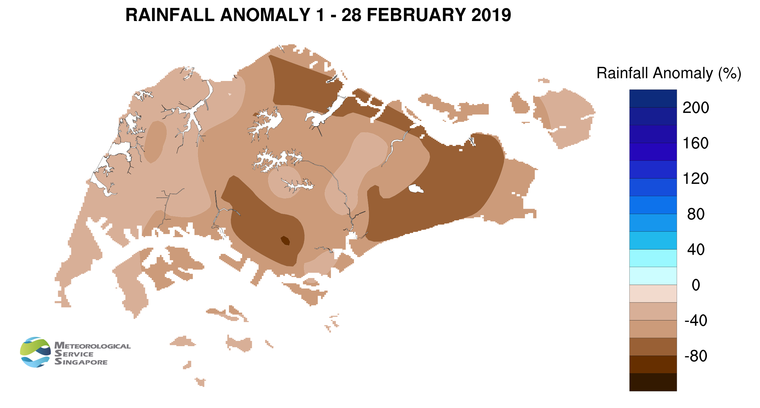Singapore, 1 March 2019 – The prevailing dry phase of the Northeast Monsoon season over Singapore and the surrounding region is expected to continue into the first fortnight of March 2019. During the fortnight, the low level winds are forecast to continue blowing from the northwest or northeast.
2 The prevailing dry and stable air mass over Singapore and the surrounding region since mid-February 2019 is forecast to persist into the first half of March 2019. This will continue to bring dry and warm weather on most days over the next two weeks. Some brief respite can be expected towards the second week of March 2019 with a weakening of the low level winds over the region. This could bring about four to five days of short-duration thundery showers in the afternoon. Overall, the rainfall for the first fortnight of March 2019 is likely to be below-normal.
3 In the first half of March 2019, with dry conditions and strong solar heating of land areas during the day, Singapore could experience warmer temperatures compared to the last fortnight in February 2019. The daily maximum temperature could reach as high as 35°C on a few days. On most days, the daily temperature is forecast to range between 24°C and 34°C.
4 For updates of the daily weather forecast, please visit our MSS website (www.weather.gov.sg), NEA website (www.nea.gov.sg), or download the myENV app, or the MSS’ Weather@SG app.
REVIEW (1 – 28 February 2019)
5 In February 2019, generally dry and warm conditions prevailed over Singapore and the surrounding region, and the low level winds were blowing from the north or northeast.
6 During the month, Singapore experienced dry, warm and occasional windy weather on most days. For a brief period in the second half of February 2019, a weakening of the northeasterly winds, with a temporary northward shift of the monsoon rain band to the equatorial region coupled with strong solar heating of land areas, brought short-duration thundery showers in the afternoon on a few days. The thundery showers that fell over many areas in the afternoon of 19 February 2019 recorded a daily total rainfall of 69.3mm at Woodlands. This is the highest daily total rainfall recorded for February 2019.
7 February 2019 was a significantly warm month. The daily maximum temperature during the month ranged between 33.0°C and 35.5°C. The highest daily maximum temperature of 35.5°C was recorded at Choa Chu Kang on 9 February 2019. On most days in the month, the daily minimum temperature was between 23.0°C and 26.1°C. The lowest daily minimum temperature in February 2019 was 21.4°C, recorded on 18 February 2019 at Admiralty. This low temperature was due to the passage of a Sumatra squall that brought showers over the island in the predawn and early morning, and some respite to the warm conditions that were felt in the days before.
8 At the climate station in Changi, the mean monthly temperature for February 2019 was 28.2°C, 1.1°C warmer than the long-term average for February. This makes February 2019 the third warmest February since temperature records began in 1929, after February 1998 and 2010 (28.9°C) and February 2005 (28.5°C).
9 Singapore received significantly below-normal rainfall in February 2019. The highest rainfall of 114.2mm (18 per cent below average) was recorded at Admiralty. Rainfall was lowest at Queenstown where 20.2mm (85 per cent below average) was recorded.

CLIMATE STATION STATISTICS
| Long-term Statistics for March
(Climatological reference period: 1981-2010) |
| Average daily maximum temperature: | 32.0 | °C |
| Average daily minimum temperature: | 24.6 | °C |
| Average monthly temperature: | 27.5 | °C |
| | | |
| Average rainfall: | 170.3 | mm |
| Average number of rain days: | 13 | |
| |
| Historical Extremes for March
(Rainfall since 1869 and temperature since 1929) |
| Highest monthly mean temperature: | 34.1 | °C (1998) |
| Lowest monthly mean temperature: | 22.1 | °C (1934) |
| | | |
| Highest rainfall ever recorded: | 528.3 | mm (1913) |
| Lowest rainfall ever recorded: | 6.2 | mm (2016) |
~~ End ~~
For more information, please contact us at 1800-CALL NEA (1800-2255 632) or submit your enquiries electronically via the Online Feedback Form or myENV mobile application.